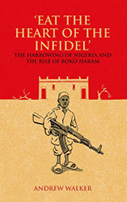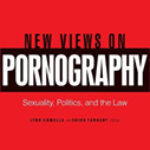‘Eat The Heart Of The Infidel’: The Harrowing Of Nigeria And The Rise Of Boko Haram

Author: Andrew Walker
Publisher: London: C. Hurst & Co., 2016. 264p.
Reviewer: Issac Kfir | March 2017
There is much to admire and appreciate in Andrew Walker’s book ‘Eat the Heart of the Infidel’ which takes the view that the emergence of Boko Haram is a product of centuries of tensions primarily between Islam, modernity and poverty. The style and manner of the book is reminiscent of Ryszard Kapuściński’s writing, as Walker like Kapuściński is a journalist. What makes the book readable, engaging and enticing are Walker’s countless anecdotes, which can get a bit frustrating at times, though they help clarify how complex Nigeria as both a state and a society is.
In ‘Eat the Heart of the Infidel,’ Walker is not only explaining the rise of Boko Haram but rather he is telling the story of Nigeria. Walker’s argument is that Boko Haram is the product of three things: History, pre-colonial Nigeria, British and Independent Nigeria; corruption; and a state system that does not provide ordinary people with basic services. The third element explains why people rely on “big potatoes” – individuals not affiliated with the state who provide basic security. At one point Walker declares, “[t]he fight against Boko Haram is not just a fight between jihadi militants and the military. It is a conflict over Nigeria’s very identity” (p. 219).
Walker opens his narrative with the story of Othman Dan Fodiyo, who is referred to as the Shehu. Dan Fodiyo was to revolutionise northern Nigeria through his preaching and infusion of strict Islamic practices. Fodiyo came from the Fulani, a collection of nomadic, pastoralists, cattle herders. Othman allegedly was a Hafiz (someone who has memorised the Qur’an) and a charismatic leader who inspired many because he was a pious man with a simple message: “only Allah should be feared, and all that was needed was to follow a very small number of principles and you would be rewarded in paradise” (p. 14). To people who face daily threats and hardships whether from the real world or the spirit world, Othman’s message made enormous sense. Othman’s sermons focused on five subjects: how to follow sharia; the importance of the Sunnah, the way of God; how not to be a bad pupil, which meant one should not be too demanding of one’s teacher; how to avoid evil customs; and, how disasters affect those that eschew sharia. Othman eventually was to lead a war – jihad – against the ruler of Gobir. Othman and his followers lost, and suffered the wrath of Sarkin Gobir Yunfa. He and his followers had to leave their homes and headed out to the Sahara where they established Dar-ul-Islam in what is today Bornu.
After recounting Othman’s rise and his beliefs, Walker shifts gears to look at the role played by westerners. Focusing on Heinrich Barth, one of the greatest of the European explorers of Africa, and Sir Frederick Lugard, an exceptionally unpleasant man who believed in “the need to prevent, by force if necessary, the enslavement of Christian converts – or potential Christian converts – by African or Arabian Muslims” (p. 49). Lugard’s view was that if a colony was to be useful to the metropole, it needed to be “reformed,” which essentially meant challenging and changing native identities. Lugard, who held various administrative positions in Nigeria such as Governor of the Southern Nigeria Protectorate, Governor of the Northern Nigeria Protectorate and Governor-General of Nigeria, actively pursued this agenda through his education policies. As part of the latter, learning was undertaken in Ajami, which is Hausa written in Arabic script. In 1909, Hans Vischer, an ex-Anglican missionary was asked to establish an education system in the Northern Nigeria Protectorate. Vischer was sensitive to local concerns that western, Christian education would undermine the Islamic nature of northern Nigeria, so lessons were in Hausa and the courses sought to avoid controversial issues. Ultimately what occurred, was the emergence of a two-tier education system, as in southern Nigeria, a British education system was being implemented. This was to have a lasting legacy on Nigeria in terms of sustaining and fostering a North-South divide, as well as in encouraging systematic corruption.
Chapter four of the book focuses on the legacy of the education system, and Walker opens it with another narrative. The story he tells is about a friend of his who grew up in Zaria, a major city in Kaduna State in northern Nigeria, in the 1960s. His friend recalls the Almajirai children would mock those who attended English schools, by claiming that those who study western education have no learning and no worship, and insult their teachers. The author describes the situation of Hadiza Umar, a Nigerian woman with three children who faces daily struggles with Nigeria’s education system, which is corrupt and ineffective. The chapter, which is quite depressing, highlights the depths of Nigeria’s poor education system. In addition to the doubts about the ability to reform and improve this system, the questions that linger with respect to any potential solutions include: Is the education system so bad because of bad pay? Is it because there is a curriculum that does not address the needs of the populace? Is there a lack of a commitment to educate? Or is there something more?
Walker’s third theme is the “big potato,” which refers to the ‘strong man’ concept. As the British brought Nigeria under their control, Lugard chose to work with many of the feudal aristocrats, who retained their power and influence once Nigeria became independent. The northern parts of Nigeria, however, could not contend with the forces of modernity, which created a massive disparity within the country between the north and the south. Because the government is seemingly unable to provide basic services, Nigerians turn to local actors to provide them with the necessary services These include in particular, security, which is provided by vigilantes such as Captain Umar Abubakar, a former naval officer.
The author’s treatment of Boko Haram begins only in part three of the book. The information here is not new, beyond what is gleaned from the interviews that Walker holds with former members of the group, and with security personnel and the general public. The focus is mainly on how the government and the security services are engaging with Boko Haram. Under former president Goodluck Johnson, Boko Haram was seen as a northern problem, whereas under the current president, Muhammadu Buhari, there is an attempt to see the rise of this group as a phenomenon that grows out of poverty, insecurity and corruption. The key is the military. Walker, like other scholars such as Daniel Egiegba Agbiboa, J. Peter Pham, Hussein Solomon, and Virginia Comolli, emphasizes the role of the Nigerian military in actually making the people more militant; the military is after all engaging in aggressive counterterrorism measures against the group. These measures include holding wives and children of members and potential members as hostages, extra-judicial killings and more — all without any form of accountability.
Clearly, ‘Eat the Heart of the Infidel’ is not truly an academic book, though it does seek to be. There are barely any academic references, for example. Rather, this is an account of Nigeria and of Boko Haram; it is descriptive as opposed to prescriptive. Walker does not reveal any new truths as to why Boko Haram has emerged or has managed to sustain itself. The value of the book lies in its engaging style. The author manages to bring Nigeria and its troubles to those not familiar with this West African country — just as Toyin Falola and Matthew Heaton did in their A History of Nigeria or John Campbell did in his Nigeria: Dancing on the Brink.
Isaac, Kfir, Research Associate, Institute for National Security and Counterterrorism (INSCT)
Syracuse University, NY, USA.
Associate Professor Tokyo International University, Tokyo, Japan


